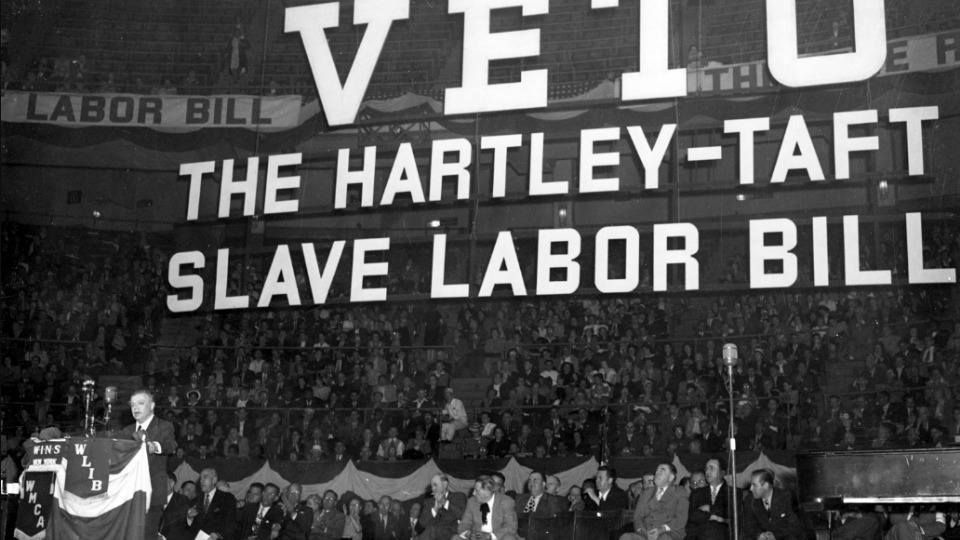
This June 23 marks the 75th anniversary of the passage of the Taft-Hartley Act, an infamous anti-labor law passed by a conservative Congress. A relic of the Cold War, it should be relegated to the trash heap of history.
Its origins go back to the 1930s, the years of the Great Depression. It was a time when the capitalist system nearly collapsed, a time of great unemployment and suffering. It was also a time when the working class and its allies rose up and fought back. With great militancy, workers in many of the major industrial unions—including those in auto, steel, rubber, electrical, and chemical—won the right to collective bargaining and were able to pass through the doorway to a better life, one based on dignity and respect.
The federal government, under the New Deal of Franklin D. Roosevelt, codified many of these hard-won gains into law, the most significant being the National Labor Relations Act (the Wagner Act) passed in 1935. This law guaranteed workers the right to organize, and if necessary, strike for their rights. Workers responded most dramatically with the founding and growth of the Congress of Industrial Organizations (CIO). In the decade between 1935 and the end of World War II, membership rose to more than three million.
Organized labor did its part to defeat fascism and win World War II by agreeing to a “no-strike” pledge. In return, many workers saw working conditions improve.
The end of wartime cooperation brought about a return to regular labor-management relations. Employers started cutting wages and began reducing other benefits that the workforce had won during the conflict. Many workers, however, did not meekly accept these take-backs. This led in 1946, to one of the greatest strike waves and labor militancy ever seen in U.S. history. According to one source, “no fewer than 116 million man-days were lost in 1946.” Massive strikes took place in the electrical, meatpacking, steel, and railroad industries as well as in many coal mines.
Though a great many corporate executives had supported New Deal labor reforms, others, including many in the National Association of Manufacturers, were strongly opposed. They couldn’t live with a militant workforce. To them, the more profit the better, and they worked ceaselessly to strengthen their control over the American economy.
And not just the American economy, but the domination of the entire world economy. To this end, forces within the government, military, and corporations were at work to destroy the wartime coalition between the western powers and the Soviet Union. It was a time that saw the birth of the military industrial complex and the development of the national security state under which we live today.
A major victory for these forces was the Republicans sweeping into control of Congress in 1946, the first time since 1932. One of their goals was to enact legislation aimed at rolling back the New Deal. The centerpiece of which was a new labor law drafted by two conservative Republicans—Robert Taft of Ohio (a grandson of the former president) and Fred Hartley of New Jersey—the Taft-Hartley Act. It’s still on the books.
Among its provisions, the law:
- Outlawed the closed shop (where a union contract stipulated that an employer could only hire union members), but permitted the union shop (where workers newly hired had to join the union, though only in places where the majority of the workers voted to require it).
- Banned secondary boycotts—unions were not allowed to boycott an employer with whom it had no dispute in order to force that company to put pressure on another company with which the union had a dispute.
- Outlawed sympathy strikes or boycotts—strikes or boycotts undertaken by workers in support of other workers involved in a labor dispute.
- Allowed states to pass “right-to-work” (for less) laws. States could ban union shops or agency shops. Today, there are such laws in 28 states. All legal challenges to these laws that have reached the Supreme Court have been defeated.
The Taft-Hartley Act was a bad law in 1947, it is a bad law today. It must be repealed and replaced by a fair labor-management system.
And Congress has that chance. The Protecting the Right to Organize Act (PRO Act) is currently before the Senate, having already passed the House. This legislation will repeal many of the negative provisions of Taft-Hartley and replace them with pro-worker language.
This is how the PRO Act would work—it sets up a fair system by which workers could organize themselves into unions, providing for employer neutrality in union organizing elections. Actions such as firing union organizers and the “captive employee meetings” carried out by Amazon, Starbucks, and others would be illegal. Under the PRO Act, employers would face stiff fines for such activities.
In addition, many contract workers would be reclassified as regular employees, union organizers would have access to employee contact information, workers would not be forced into signing agreements waiving their right to joining class-action lawsuits, and labor agreements would be extended to workers of franchised operations. Also, the time under which organizing and negotiating took place would be greatly reduced—employers would not be able to drag out these processes. The PRO Act would also outlaw the “right-to-work” (for less) laws of the states
The growing wave of labor militancy sweeping across the country provides a catalyst for all good-minded people to work to give the American working class the opportunity to reverse the setbacks of the last three-quarters of a century. It’s time to bury Taft-Hartley.










